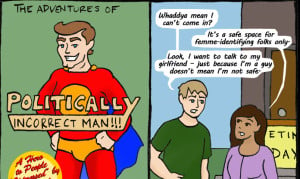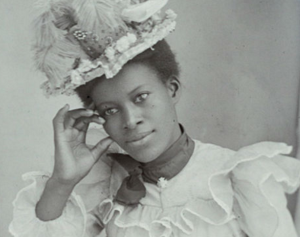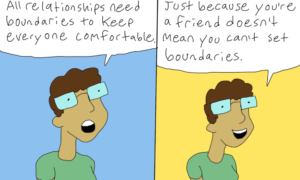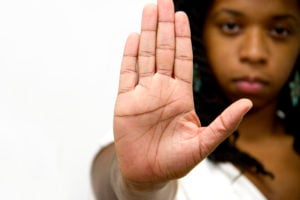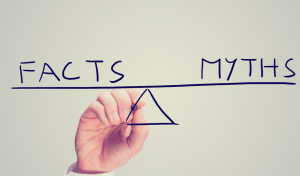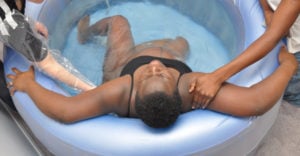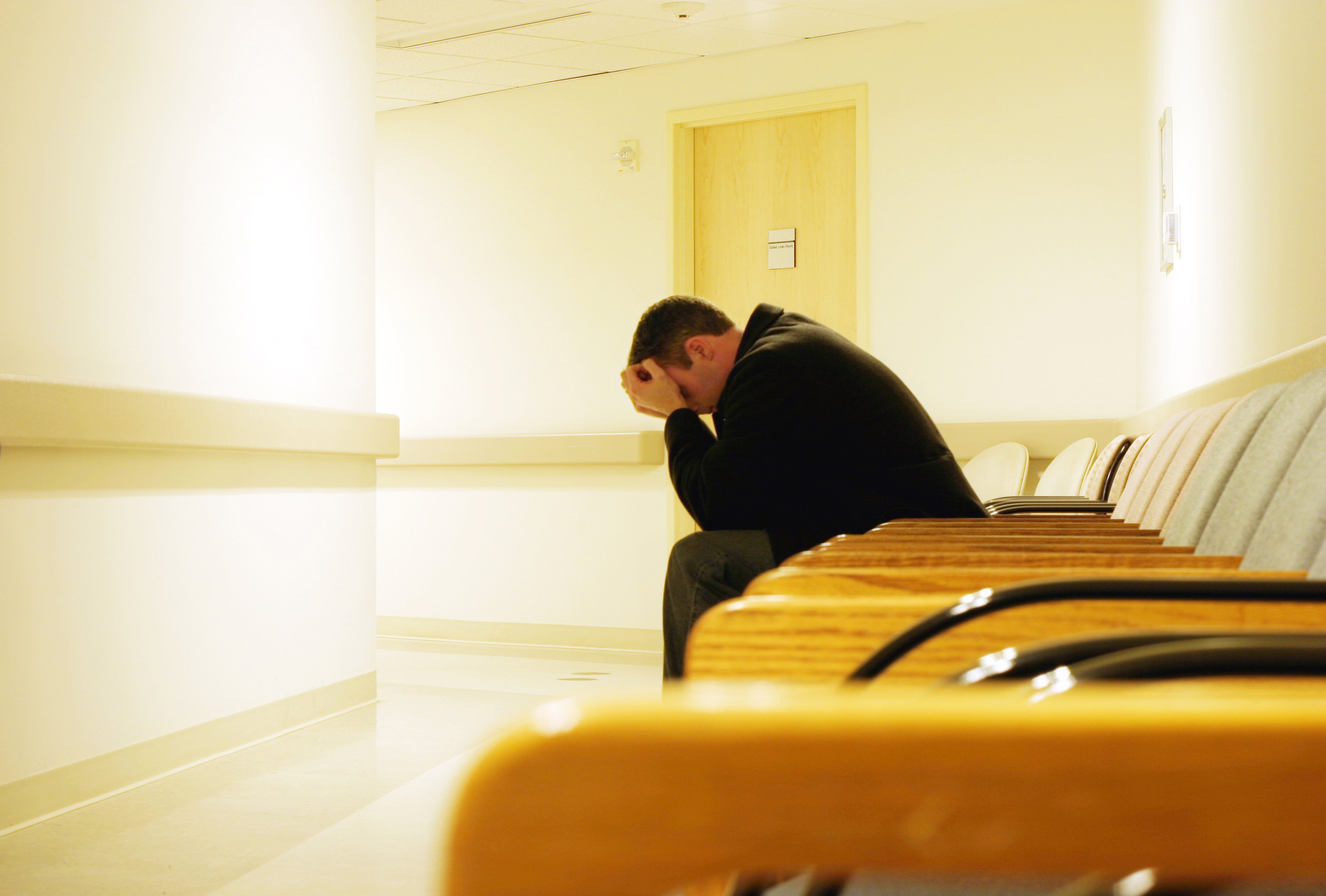
Person sitting in a yellow waiting room with their head in their hands.
This past summer, I summoned up the courage to tell a medical provider about my gender non-binary identity. It was my first visit with a white, presumably cisgender (cis) female psychiatric nurse practitioner.
She didn’t appear too startled by my revelation and asked if I was on any hormones, which seemed like a reasonable follow-up question. I never went back because I didn’t feel a connection with her, but I’m grateful that revealing my gender wasn’t a terrible experience.
Since then, I haven’t felt empowered enough to be upfront about my gender with my medical providers. I’ve been judged too many times just for being who I am, so I’m anxious about enduring the same treatment from providers if I tell them my gender.
Furthermore, I’ve heard numerous medical horror stories from friends that have made me fully aware of the discrimination faced by trans and gender non-conforming people in healthcare settings.
About 70 percent of trans and gender non-conforming people are discriminated against while receiving healthcare. This includes being refused needed care, healthcare professionals not wanting to touch them and being physically abused, according to a 2010 Lambda Legal survey.
This crisis stems from medical providers narrowly understanding the gender binary, which classifies only two distinct genders: Masculine males who identify as men and feminine females who identify as women. It assumes that our private parts correspond to a certain gender.
The truth is there are way more than two genders, and gender is a fluid thing. It can change several times during a person’s life. Our body parts don’t determine our gender, and we deserve to have our genders affirmed, even when they fall outside of the binary.
Hayley Gorenberg, general counsel at Lambda Legal, is currently fighting for the federal government to recognize non-binary people. She’s suing the US State Department on behalf of Dana Zzyym, a non-binary intersex veteran who needs a passport that matches their gender.
Gorenberg says there’s growing traction in the states for non-binary genders to be recognized. Residents of California, Oregon, and Washington DC are able to choose “X” as their gender on driver’s licenses and identity cards.
Being non-binary is slowly becoming more accepted, but we have a long way to go before society views our gender as valid. Until non-binary identities are better understood by the mainstream, going to the doctor will continue to be stressful for people like me.
Here are four things that suck about going to the doctor when you’re a nonbinary person:
1. We’re misgendered, “deadnamed,” and unnecessarily gendered.
Misgendering happens even before non-binary people arrive at the doctor’s office.
“I’ve had a hard time just getting my healthcare providers to update my pronouns in their system, so when I have to call to make appointments, I get called ‘ma’am’ and ‘miss’ often,” says Aries*, a 31-year-old genderqueer organizer and artist living in LA.
“I’ve specifically asked for it to be noted on my record not to call me that, and it’s still pretty inconsistent.”
Once in the waiting room, non-binary folks typically find that “male” and “female” are the only gender categories on medical intake forms. It’s implied that the forms are referring to cis males and cis females.
The waiting room can become a triggering space when non-binary people are called by names they were assigned at birth that they no longer use (which are often called “dead names” by trans folks) or by honorifics that don’t match their gender, such as “ma’am” and “sir.”
When people are misgendered or called their “dead names” by medical staff, they may experience gender dysphoria, which is distress that happens “when the gender someone is assigned does not align with their actual gender.”
Medical providers also cause distress by unnecessarily labeling body parts, tests, and exams as “male” or “female.” Pap smears aren’t just for women; they’re for anyone with a cervix.
2. Doctors don’t understand our bodies, our lives or our families.
Earlier this year, Aries attended a trans therapy support group that showed them how inadequate our healthcare system is at serving non-binary people.
The group facilitators used outdated curriculum written by cis people that included language such as “opposite gender.” Facilitators expressed confusion about a standard gender-affirming surgery and characterized medically transitioning as a “dangerous process.”
“The whole thing was condescending. It didn’t recognize trans people’s agency and on top of that, it also erased non-binary people,” Aries says.
Healthcare providers also alienate us when they don’t understand our family structures. Many trans and gender non-conforming people have been rejected by our biological families and form our own chosen families.
If we want chosen family members to make medical decisions for us when we’re not able to, we should be able to exercise that right. There are devastating consequences when queer and trans families of choice aren’t recognized by doctors.
In 2008, Gorenberg filed a lawsuit on behalf of a queer woman named Janice Langbehn against a Florida hospital that denied Langbehn from seeing her dying partner of 18 years because they weren’t legally married.
While they lost the case, it ultimately resulted in the Department of Health and Human Services issuing federal regulations that stop hospitals from discriminating against visitors based on sexual orientation, gender identity and other characteristics.
While some non-discrimination laws exist to protect non-binary people in healthcare settings, we suffer when they’re not followed or enforced. Doctors need to better understand these laws to better understand queer and trans lives.
3. We’re treated as if our bodies are abnormal.
Non-binary bodies are beautiful because they’re different, but some doctors view them as unusual and strange.
According to Gorenberg, non-binary bodies can be subject to medically unnecessary inspections; having extra staff called into the room to gawk at body parts, and being referred to medical specialists for no reason.
Being non-binary isn’t a medical condition in itself. While we need healthcare that allows us to feel like the gender we are, that doesn’t mean our bodies are freakshows requiring expensive specialized care.
Getting treated this way is abusive, harassing and PTSD-inducing for trans and gender non-conforming people. Having their body disrespected by a doctor may discourage them from seeking out care in the future because they’d rather be sick than be retraumatized.
4. We have to prove our gender to get care that affirms our gender.
To access gender-affirming care such as hormones and top surgery (removal of the breasts), trans folks have to jump through hoops by proving their gender. They have to present in a very specific medically-defined way.
Aries believes that having to present as male to get top surgery doesn’t hold space for their non-binary identity. They feel they shouldn’t have to perform a certain gender to get care that allows them to live in their body.
“In a dream world, trans people and non-binary people would have the self-determination to decide how their bodies look and feel and what access to care that they have without having to go through gatekeepers,” Aries says.
Also in a dream world, non-binary intersex people wouldn’t be pressured to have surgeries on their genitals to fit into the gender binary.
Genital surgeries are forced upon non-binary intersex infants and children without their consent and are almost always medically unnecessary. These surgeries can have horrific, irreversible results, such as sterilization, decreased fertility and decreased sexual function.
Non-binary people are perfect just the way we are. We should never have to prove or alter ourselves to be worthy of care, compassion and the right to make our own decisions about our bodies.
***
Culturally-competent care for non-binary people looks like doctors using forms with several gender options or an “other” category; not unnecessarily gendering things; being comfortable asking for gender pronouns, and offering their own pronouns to patients.
One day, all trans and gender non-conforming folks will have access to doctors, therapists and other healthcare providers who share our lived experiences. We deserve care from peers who will acknowledge our gender identities as important and real.
*name has been changed
[do_widget id=’text-101′]
Neesha Powell-Twagirumukiza (she & they pronouns) is an Everyday Feminism Reporting Fellow. Neesha identifies as an intersectional feminist, womanist, writer, community organizer, facilitator, dancer, freedom fighter, wife, and cat mama. She’s constantly conspiring in the name of liberated Black futures, queer and trans people of color power, solidarity economics, and transformative justice/community accountability. Neesha’s based in a suburb south of Seattle, where she lives, loves, and creates with chosen family.
Search our 3000+ articles!
Read our articles about:
Our online racial justice training
Used by hundreds of universities, non-profits, and businesses.
Click to learn more
Most Read Articles
- « Previous
- 1
- …
- 30
- 31
- 32





